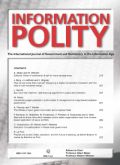is dedicated to publishing work from two main sources: academic and practitioner. The journal publishes work from academics that is both of top quality and, equally, of high strategic relevance to practitioners. Secondly, the journal is intent on publishing work undertaken by practitioners – professional, administrative and political – who are actively engaged in the broad arenas of government and democracy, whether at local, regional, national or supra-national levels.
Information Polity is dedicated to publishing work from two main sources: academic and practitioner. The journal publishes work from academics that is both of top quality and, equally, of high strategic relevance to practitioners. Secondly, the journal is intent on publishing work undertaken by practitioners – professional, administrative and political – who are actively engaged in the broad arenas of government and democracy, whether at local, regional, national or supra-national levels.
The journal is both international and comparative in its perspectives and welcomes articles from scholars and practitioners throughout the world. The journal is a tangible expression of the awareness that ICT, including the Internet, is of deepening significance for all polities as new forms of government and democratic practice are sought throughout the world. This journal establishes a role for itself in these contexts, seeking both to capture and stimulate debate.
The journal publishes articles on political, economic, legal, managerial, organizational and wider social themes and issues as they relate to policy developments surrounding information & communications technologies (ICT) in government and democracy. Examples of such themes and issues are:
The modernization of government and ICT
Consumer responsive government
Joined up government and ICT
The globalisation of government and ICT
Virtual government
Data privacy, protection and security
Democratic innovation and ICT
The citizen, the state and ICT
Changing ICT-supported democratic practices in the contemporary polity
Public policies for ICT development and adoption
Publishing in Information Polity
The journal is keen to receive well-written journal articles from its targeted authors on topics as stated above. Articles submitted for consideration must be written in English. Academic articles submitted should normally not exceed 6000 words in length [including all footnotes]. Articles in the form of authoritative, well-researched case studies will be welcomed and will not normally exceed 4000 words. The journal will welcome polemical articles as well as those deriving from research and practice. The journal will also commission book reviews. All articles submitted to the journal will be refereed by at least 2 expert readers. Readers will normally complete reviews of submitted articles within 2 months of their receipt.
Information Polity is dedicated to publishing work from two main sources: academic and practitioner. The journal publishes work from academics that is both of top quality and, equally, of high strategic relevance to practitioners. Secondly, the journal is intent on publishing work undertaken by practitioners – professional, administrative and political – who are actively engaged in the broad arenas of government and democracy, whether at local, regional, national or supra-national levels.
The journal is both international and comparative in its perspectives and welcomes articles from scholars and practitioners throughout the world. The journal is a tangible expression of the awareness that ICT, including the Internet, is of deepening significance for all polities as new forms of government and democratic practice are sought throughout the world. This journal establishes a role for itself in these contexts, seeking both to capture and stimulate debate.
The journal publishes articles on political, economic, legal, managerial, organizational and wider social themes and issues as they relate to policy developments surrounding information & communications technologies (ICT) in government and democracy. Examples of such themes and issues are:
The modernization of government and ICT
Consumer responsive government
Joined up government and ICT
The globalisation of government and ICT
Virtual government
Data privacy, protection and security
Democratic innovation and ICT
The citizen, the state and ICT
Changing ICT-supported democratic practices in the contemporary polity
Public policies for ICT development and adoption
Publishing in Information Polity
The journal is keen to receive well-written journal articles from its targeted authors on topics as stated above. Articles submitted for consideration must be written in English. Academic articles submitted should normally not exceed 6000 words in length [including all footnotes]. Articles in the form of authoritative, well-researched case studies will be welcomed and will not normally exceed 4000 words. The journal will welcome polemical articles as well as those deriving from research and practice. The journal will also commission book reviews. All articles submitted to the journal will be refereed by at least 2 expert readers. Readers will normally complete reviews of submitted articles within 2 months of their receipt.





